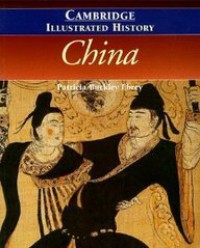Jocelyn (The Reading World)
I love to read and can get very attached to my opinions, but recently I've been learning not to completely lose my head when people disagree with me, so feel safe to argue with me whenever you wish ;)
The Cambridge Illustrated History of China

An overview of China from prehistoric times to the present that serves its purpose well. As with most histories, information density is weighted towards modern times, with a disproportionate number of pages spent on the Qing dynasty, early twentieth century and the People's Republic. Having said that, 2,000 years of imperial history still inevitably ends up with a lot of focus. Bigger emphasis is placed on wider patterns of growth and change than top-down political intrigue, with few individual names mentioned except for the major figures of the twentieth century.
Surprising amount of time was spent on the Northern and Southern Dynasties period, for what I thought was good reason: the first major diffusion of Buddhism, creation of institutions that the Sui dynasty would adapt to end three and a half centuries of division. Ebrey notes in an interesting statement that China very well might have split into two permanent kingdoms of north and south, just as the Roman Empire did into east and west, although it ultimately did not. One long-term impact of such an event is a cultural tendency to look on periods of division as undesirable, with the ideal state being "All-Under-Heaven" as a single entity.
One continuous theme is China's seemingly endless give and take with what they saw as "barbarian" cultures, that is, the various groups of people on China's geographical periphery: the Xiongnu, Xianbei, Tibetans, Jurchens, Mongols, and Manchus being the major ones in chronological order. I like how Ebrey analyzes their distinct relationships with China as the narrative goes on: the Xianbei, for example, ended up assimilating almost fully into the Chinese, while the Mongols resisted such integration and withdrew into their homeland after the fall of the Yuan. I also notice that Ebrey avoids taking a cyclical view while still describing a Chinese identity that managed to endure. It was especially during the period of Mongol rule--the first time an outsider ruled over a united Chinese empire--that the native Chinese were forced to question the centrality and universalism of their culture. Ebrey's overall view is one that empathizes with the perspective of the Chinese, without falling to the biases inherent to a nationalistic standpoint.
Quite thoughtful was the evaluation of the Ming dynasty, a period generally criticized as "a dead weight, slowing down innovation and entrepreneurship just when some real competition was about to emerge." While political administration was flawed, the Ming also witnessed a growth in population, trade, and publishing as well as an extended period of peace. Also notable was the development of full-length novels, producing some of the greatest Chinese works known today: Water Margin, The Romance of the Three Kingdoms, Journey to the West, and Plum in the Golden Vase.
Some fun memorable bits: Cao Cao--the main villain in Romance of the Three Kingdoms--and two of his sons were excellent poets, developing the potential of verse in lines of five syllables that would eventually be used by the most famous of Tang poets. And the two-page section on Dream of the Red Mansions really makes me want to read it. Just look at the illustrations, man!








 2
2
